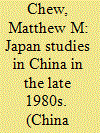|
|
|
Sort Order |
|
|
|
Items / Page
|
|
|
|
|
|
|
| Srl | Item |
| 1 |
ID:
092875


|
|
|
|
|
| Publication |
2009.
|
| Summary/Abstract |
This article adopts a sociology of knowledge perspective to analyze Japan studies scholarship published in China in the late 1980s. The objective of the analysis is to interpret the significant body of scholarship in terms of three of its sociopolitical implications. Firstly, the role of scholarship in its advocacy of Japan as a development model for China will be examined, thereby uncovering one of the multiple historical sources for the Chinese reform. Secondly, Japanese studies scholars, despite their being establishment intellectuals, made bold proposals in the late 1980s for economic, political, and social change. Thirdly, this article will document the Japan studies scholars' largely positive appraisal of Japan as well as their resistance of anti-Japanese sentiments in the Chinese state and society. Findings indicate that the scholarship deviated from the official line, critiqued the Chinese state, promoted radical reform proposals, positively evaluated Japan, and offered a Japanese model for China's reform.
|
|
|
|
|
|
|
|
|
|
|
|
|
|
|
|
| 2 |
ID:
118942


|
|
|
|
|
| Publication |
2013.
|
| Summary/Abstract |
It is widely known that Chinese transition to market economy was influenced by the newly industrialized Asian countries-Malaysia, Taiwan, and Hong Kong-but it is not as much evident that Chinese reform was also influenced by the economic reforms of Hungary. Hungary started market-oriented reforms in the late 1960s by introducing market-orientated measures in agriculture, in manufacturing, in retail trade, and in finances, which made Hungarian economy more flexible and efficient than other European socialist countries. It could be shown that the first market-oriented reform measures applied in China during the 1980s and 1990s have large similarities to the Hungarian reform introduced earlier. In that respect, we can say that Chinese economic reform has adapted lots of elements of the early Hungarian economic reform. At the same time, Hungarian reforms have died away, but after the "lost decade of the 1980s," there was an extremely rapid transition to market economy, which-in spite of the seemingly successful beginning-could not contribute to a long-term and healthy economic development. Meanwhile in China, economic reform was rather successful, resulting in an unprecedented economic development at the end of the twentieth century. Authors of the present article analyse similarities of the Hungarian and Chinese reforms and try to explain the causes of the Hungarian failure and the Chinese success. "Let China Sleep, for when the Dragon awakes, she will shake the world." The saying is attributed to Napoleon and he seems to have been right. Now that China has reversed the process of globalization and has become the winner, we should resignedly accept that China is wide awake. The country's economy has followed a rapid growth path thus China's economic dominance is felt in the entire Far East; moreover, the country with the highest population in the world the country is taking steps to emerge as a world power. The dragon is awake, and she is not going to take a great leap forward but instead it is now on the long march. In lieu of her specific tools, China is about to win: she is already one of the winners, if not the only winner of globalization.
|
|
|
|
|
|
|
|
|
|
|
|
|
|
|
|
|
|
|
|
|